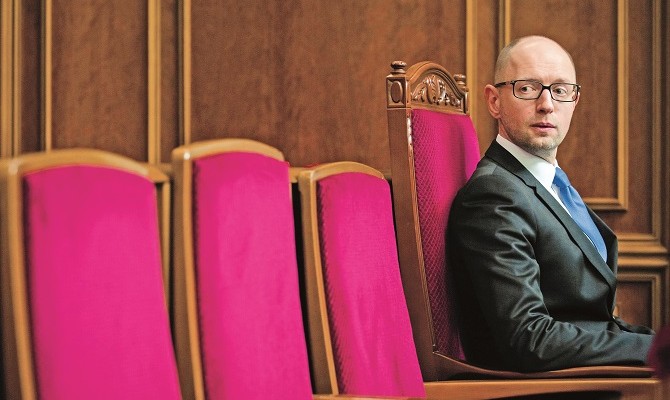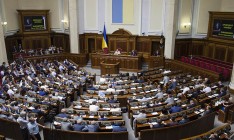Politics
Change of PowerArseniy Yatsenyuk will have a fresh start, but with a new team

Yesterday, the Verkhovna Rada approved the composite of the new government after several weeks of negotiations. The process of approval of the candidates and voting in the session hall demonstrated the fragility of the new coalition and emerging disagreements among its members.
Oppositional line
Coordination of the candidacies of the former ministers continued throughout the day yesterday. Despite that at around 12:00 am on Tuesday the coalition handed the list of the candidates for positions in the government to Premier Arseniy Yatsenyuk, the disputes over a number of posts continued. It was further aggravated by the fact that the coalition members could not find common grounds on the distribution of parliamentary committees, which were a part of the agreements on the composite of the government.
Capital’s source in the Petro Poroshenko Bloc said the deputy groups People’s Will of Ihor Yeremeyev and Economic Development of Vitaliy Khomutynnyk demanded more committees than the coalition had proposed to them earlier. “Yeremeyev wanted two committees and Khomutynnyk – three. They insisted that the parliament’s opposition must control seven committees,” said the source. As a reminder, the People’s Front and the PPB were ready to allot two committees to the Opposition Bloc and one to each deputy group.
Meanwhile, the competition for the right to be called the opposition in the VR is becoming stiffer. For instance, yesterday Right Sector’s leader Dmytro Yarosh announced plans to form an opposition group in the parliament by the end of the year. It should include commanders of voluntary battalions, former deputy head of the Dnipropetrovsk Oblast State Administration Borys Filatov and deputies of Svoboda. It is assumed that the group will be named Ukrop – Ukrainian Opposition. Earlier, however, the optional name Maidan was considered, according to information that Capital possesses.
At the moment, 14 individuals are ready to join the group, according to Filatov, though according to the regulations of the VR at least 19 are required to form a group. “We want to chair the anti-corruption committee,” said MP Volodymyr Parasyuk (independent), specifying that the future group may have new demands to managerial positions.
Absence of the agreement on committees resulted in the parliament twice postponing the consideration of the government’s issue in the session hall. By the evening the Samopomich faction demanded to postpone the voting. “Its members were trying to figure out the issue of committees and delayed the voting for ministers until the last minute,” Viktor Chumak (PPB) told Capital.
According to a source in the PF, Samopomich was absent at the meeting of the Coalition Council, where the last preparations were made for the election of the Cabinet of Ministers. “They reject every decision, but offer no alternatives. That is why dialog with them is difficult,” he said. Samopomich explained its absence by the fact that it met with candidates for ministerial positions. Faction leader Oleh Berezyuk told Capital that they had reservations about a number of candidates.
Protracted voting
Changes were made to the list of the ministers at the last moment before the vote. For instance, in the morning MP Lyudmyla Denysova (PF) announced the agreement inside of the coalition regarding her nomination to the position of the Minister of the Cabinet of Ministers. However, several hours later her name disappeared from the list. Instead, Deputy Justice Minister and head of the ministry’s apparatus Anna Onyshchenko was placed on the list for this position. “Many members of the coalition feared that in this position, which is responsible for government staffing, Denysova would lobby her people and demanded that she be replaced,” a source in the PPB told Capital.
He said that due to the insistent demands of the Radical Party to head the VR Budget Committee, they were proposed the post of vice speaker. Meanwhile, Batkivshchyna lost the position of the vice speaker for which Yatsenyuk earlier proposed Ihor Zhdanov. Instead, the team of Yulia Tymoshenko managed to convince the coalition to give it the leadership of the Ministry of the Environment. “Yulia Tymoshenko insisted on this ministry and we met her half-way,” said the source in the PPB.
In addition, the coalition agreed to give the portfolio of the Minister of Infrastructure to the team of Yeremeyev hoping for the votes of his group People’s Will, particularly since right before the vote Samopomich announced a protest against the package approval of the government’s composite. “We are against the package; this is a crack inside the coalition,” MP Yehor Sobolev (Samopomich) told Capital.
When VR Speaker Volodymyr Groysman put the government’s election to vote only 229 deputies voted in favor of the decision. At that, independent deputies, including Serhiy Klyuyev and Serhiy Kivalov, saved the coalition from failure. However, after the vote it turned out that the VR speaker put the approval of the Cabinet only in the first reading and therefore it was decided to let the candidates speak. Nonetheless, the attempt to hold full-fledged discussions failed. After insistent requests of Premier Yatsenyuk, the deputies finally voted in favor of the new government with 288 votes, which is even less than the number of coalition members.
Arseniy Yatsenyuk,
Premier
The victory of the People’s Front in the snap parliamentary elections made it possible for Yatsenyuk to return to the office of the premier for the second time. Prior to the elections President Petro Poroshenko considered Volodymyr Groysman for this office, who eventually was elected speaker of the parliament.
Vyacheslav Kyrylenko,
Vice Premier, Minister of Culture
He was in charge of social and humanitarian policy in the governments of Tymoshenko and Yekhanurov. He was the leader of the Our Ukraine party in the times of decline of its influence. He took active part in the creation of the People’s Front electoral project.
Hennadiy Zubko,
Vice Premier, Minister of Housing Utilities Complex
Despite the fact that Zubko has been the leader of the Zhytomyr oblast organization of the Front for Change, since this spring he has been one of Petro Poroshenko’s closest allies. After the presidential elections he has been serving as First Deputy Chief of the Presidential Administration responsible for regional policy.
Aivaras Abromavicius,
Minister of Economic Development
He is a native of Vilnius (Lithuania), a partner at the Swedish company East Capital, which invested in Ukraine more than US $200 mn. He worked in Russia for 3 years, but currently lives in Kyiv. He is married to a Ukrainian.
Valeriy Vashchevskiy,
Vice Premier
He supervised the election headquarters of the Radical Party. He previously tried to become an MP as one of the members of the Team of the Winter Generation electoral alliance headed by Valeriy Khoroshkovsky at the time. After the election Vashchevskiy became Deputy Minister of Economy. He served as the head of the Ukravtodor company for a month.
Natalia Yaresko,
Minister of Finance
She was born in Chicago to a family of Ukrainian immigrants. She worked at the U.S. Department of State. Since the early 1990s she has been living in Ukraine. Yaresko is a co-founder at the investment company Horizon Capital. Lviv Mayor Andriy Sadoviy was the one to support her candidacy.
Hanna Onyshchenko,
Minister of the Cabinet of Ministers
Since March she has served as deputy to Justice Minister Pavlo Petrenko and chief of the ministry’s office. In 2009–2013 Onyshchenko has been the head of the Corporate Sales Department at the MLGroup Legal Firm. Petrenko was one of the firm’s co-founders.
Alexander Kvitashvili,
Minister of Healthcare
Held a similar post in the government of Georgia in 2008-2010, supervised the ministry during the military conflict with Russia. Kvitashvili has extensive experience working in Ukraine. Since this summer he has been an expert of the Strategic Advisory Group of the Ministry of Healthcare.
Volodymyr Demchyshyn,
Minister of Energy and Coal industry
Since August he has served as the Chief of the National Commission for State Energy and Public Utilities Regulation. Prior to that, he never worked in the energy sector. Since 2008, Demchyshyn has been the Director of Investment Banking Services Department at the ICU Group, which was co-owned and headed by Governor of the National Bank of Ukraine Valeria Hontareva.
Andriy Pyvovarskiy,
Minister of Infrastructure
For the last two years he has been the head of the Continuum Group of Companies interested in the oil and food markers. Among the group's shareholders are Ihor Yeremeyev and Stepan Ivakhiv, founder of the parliamentary group People’s Will.
Ihor Shevchenko,
Minister of Environment
He is a candidate from the Batkivshchyna party and was an adviser to Yulia Tymoshenko in 2005. Since the early 1990s, he has been working as a lawyer and initiated creation of the Meritocratic Party. He is believed to be close to ex-MP of Batkivshchyna Oleh Lukashuk.
Yuriy Stets,
Minister of Information Policy
He is a relative of the president and was a member of the Supervisory Board of the TV Channel 5. He was the head of the Solidarnist Party, which this year was renamed into the Petro Poroshenko Bloc. Stets also served as the head of the Information Security Administration in the National Guard of Ukraine.
Ihor Zhdanov,
Youth and Sports Minister
He was the leader of the headquarters of Batkivshchyna during the elections to the parliament. In 2004, he was one of the leaders of Viktor Yushchenko’s staff in the presidential election. He was a member of the central headquarters of the Our Ukraine. Zhdanov is President of the Open Policy Analytical Center.
Arsen Avakov,
Interior Minister
The People’s Front and the Petro Poroshenko Bloc went through the most bitter struggle for this position. As a result, Yatsenyuk’s team had to sacrifice the position of speaker of the parliament, for which the party proposed Oleksandr Turchynov.
Oleksiy Pavlenko,
Minister of Agrarian Policy and Food
He was nominated by the Samopomich party and had experience in managing the Foxtrot chain of stores. In recent years, Pavlenko worked in senior positions in companies associated with ex-MP Ihor Kurovskiy and has interests in agriculture and construction businesses.
Pavlo Petrenko,
Minister of Justice
He was recommended to the government after the Euromaidan. His work in this position is remembered for the launch of the process of lustration. Prior to that, he served as deputy to chairman of the Batkivshchyna party Arseniy Yatsenyuk – his classmate and townsman.
Pavlo Rozenko,
Minister of Social Policy
He worked in the ministry as the first deputy in 2005. He was elected to the VR as a member of the UDAR party and the Petro Poroshenko Bloc. During the last election campaign Rozenko worked in the headquarters of the pro-presidential party.
Serhiy Kvyt
Minister of Education and Science
He was recommended for this position in the previous Cabinet in the Maidan in February 2014. Previously, he was President of the Kyiv-Mohyla Academy, remembered as an active supporter of the Euromaidan.
Stepan Poltorak
Defense Minister
Eighteen months ago he was appointed to the post of minister – the fourth this year. Prior to that he founded and headed the National Guard of Ukraine in the Interior Ministry. Poltorak conducts personnel purges of the leadership of the defense department. He also is attempting to reform the support system in the AFU.
Pavlo Klimkin,
Foreign Minister
After winning the presidential election Petro Poroshenko recommended Klimkin for the ministerial office. He helped activate the EU’s and the NATO’s efforts for provision of military assistance and fully coordinates his activities with the policies of the Presidential Administration.





 of the agreement of syndication with Financial Times Limited are strictly prohibited. Use of materials which refers to France-Presse, Reuters, Interfax-Ukraine, Ukrainian News, UNIAN agencies is strictly prohibited. Materials marked
of the agreement of syndication with Financial Times Limited are strictly prohibited. Use of materials which refers to France-Presse, Reuters, Interfax-Ukraine, Ukrainian News, UNIAN agencies is strictly prohibited. Materials marked  are published as advertisements.
are published as advertisements.